虚拟语气用法归纳 (2)
(完整版)英语虚拟语气语法归纳总结
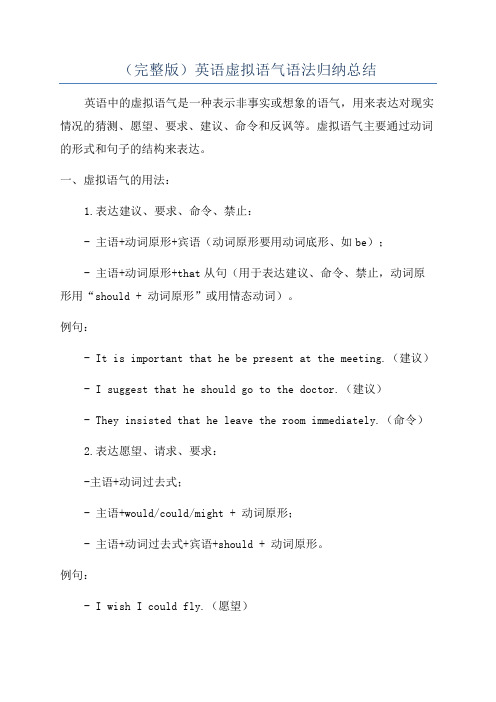
(完整版)英语虚拟语气语法归纳总结英语中的虚拟语气是一种表示非事实或想象的语气,用来表达对现实情况的猜测、愿望、要求、建议、命令和反讽等。
虚拟语气主要通过动词的形式和句子的结构来表达。
一、虚拟语气的用法:1.表达建议、要求、命令、禁止:- 主语+动词原形+宾语(动词原形要用动词底形、如be);- 主语+动词原形+that从句(用于表达建议、命令、禁止,动词原形用“should + 动词原形”或用情态动词)。
例句:- It is important that he be present at the meeting.(建议)- I suggest that he should go to the doctor.(建议)- They insisted that he leave the room immediately.(命令)2.表达愿望、请求、要求:-主语+动词过去式;- 主语+would/could/might + 动词原形;- 主语+动词过去式+宾语+should + 动词原形。
例句:- I wish I could fly.(愿望)- I would appreciate it if you could help me.(请求)3.表示虚拟条件:- If条件从句中的谓语动词用过去完成时,主句用would/should/might/could + have + 过去分词;- If条件从句中的谓语动词用过去时,主句用would/should/could + 动词原形。
例句:- If I had known his phone number, I would have called him.(虚拟条件)- If you had listened to me, we could have finished the project earlier.(虚拟条件)4.表达建议、要求、祝愿:- If only内部称述 + 主语 + 过去式。
虚拟语气的常见用法总结

虚拟语气的常见用法总结虚拟语气是一种特殊的语气形式,用来表示说话者对某种情况是假设、愿望、建议或推测等的态度。
在英语中,虚拟语气的用法相对复杂,但是掌握了常见的用法,就能够在表达自己的意思时更加准确和自如。
一、虚拟语气的定义和用法虚拟语气用于表达说话者的假设、愿望、建议、命令、要求、要求、要求等意愿情态。
在语法上表现为动词形态的变化和句子结构的变化。
以下是虚拟语气的常见用法。
1. 假设虚拟语气常用于表达假设,即假设一种不存在的情况。
例句:If I were a bird, I would fly freely in the sky.意思:如果我是一只鸟,我会自由自在地在天空中飞翔。
2. 愿望虚拟语气也可用于表达愿望,即希望实现一种未来的情况。
例句:I wish I had a car.意思:我希望我有一辆车。
3. 建议虚拟语气还可用于表达建议或推荐的动词后面。
例句:I suggest that he go to the doctor.意思:我建议他去看医生。
4. 命令或要求虚拟语气也可用于表示命令、要求或愿望等。
例句:She demanded that he leave immediately.意思:她要求他立即离开。
二、虚拟语气的形态变化在虚拟语气中,动词的形态会发生变化。
以下是常见的虚拟语气形态变化:1. 过去式(对于现在情况的虚拟)例句:If I had more time, I would travel around the world.意思:如果我有更多时间,我会周游世界。
2. 过去完成式(对于过去情况的虚拟)例句:If I had studied harder, I would have passed the exam.意思:如果我学得更努力,我就能通过考试了。
3. should + 动词原形(用于建议、命令或要求等)例句:I suggest that he should go to the dentist.意思:我建议他去看牙医。
虚拟语气的用法归纳

虚拟语气的用法归纳虚拟语气是英语中一种特殊的句式,它用来表达与事实相反或与实际情况有差别的意思。
它可以帮助我们表达不同形式的否定、虚拟假设、条件、建议、建议等。
本文将对虚拟语气的用法进行归纳,以便更好地理解它。
一、虚拟语气的基本概念虚拟语气是一种特殊的句式,它表示“如果”的意思,即“假如”,“要是”,“如果”,“就好了”,“就像”,“就算”等。
它可以表达不同形式的否定、虚拟假设、条件、建议、建议等。
二、虚拟语气的使用1. 否定形式:如果不,要是不,就算不,就好了不,就像不。
例句:If he didn't come, I wouldn't be here now.2. 条件形式:如果,要是,就算,就好了,就像。
例句:If it rains tomorrow, we'll have to cancel the picnic.3. 虚拟假设形式:如果,要是,就算,就好了,就像。
例句:If I had a million dollars, I'd travel around the world.4. 建议形式:如果,要是,就算,就好了,就像。
例句:If I were you, I would take this opportunity.三、虚拟语气的动词形式1. 一般时态:Should/would/could/might(动词原形)例句:I should go to bed early if I want to wake up early.2. 过去时态:should/would/could/might + have + 动词过去分词例句:I should have gone to bed earlier if I wanted to wake up early.3. 将来时态:should/would/could/might + be going to + 动词原形例句:I should be going to bed early if I want to wake up early.四、虚拟语气的重要点1. 虚拟语气使用在if引导的句子中,即虚拟条件句。
虚拟语气的用法总结
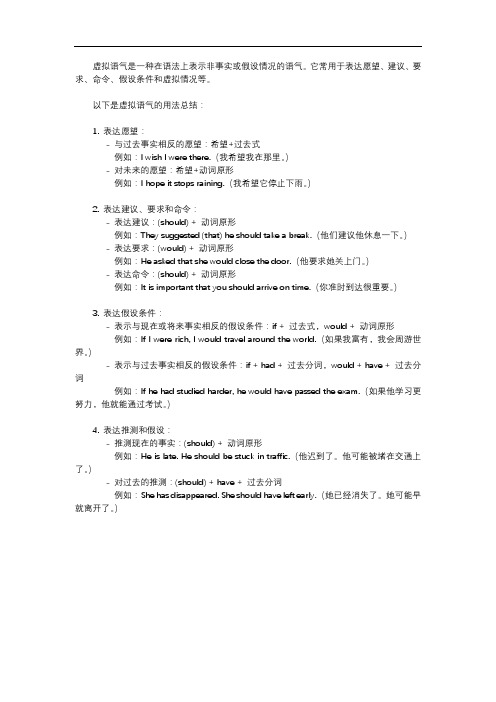
虚拟语气是一种在语法上表示非事实或假设情况的语气。
它常用于表达愿望、建议、要求、命令、假设条件和虚拟情况等。
以下是虚拟语气的用法总结:1. 表达愿望:- 与过去事实相反的愿望:希望+过去式例如:I wish I were there.(我希望我在那里。
)- 对未来的愿望:希望+动词原形例如:I hope it stops raining.(我希望它停止下雨。
)2. 表达建议、要求和命令:- 表达建议:(should) + 动词原形例如:They suggested (that) he should take a break.(他们建议他休息一下。
)- 表达要求:(would) + 动词原形例如:He asked that she would close the door.(他要求她关上门。
)- 表达命令:(should) + 动词原形例如:It is important that you should arrive on time.(你准时到达很重要。
)3. 表达假设条件:- 表示与现在或将来事实相反的假设条件:if + 过去式,would + 动词原形例如:If I were rich, I would travel around the world.(如果我富有,我会周游世界。
)- 表示与过去事实相反的假设条件:if + had + 过去分词,would + have + 过去分词例如:If he had studied harder, he would have passed the exam.(如果他学习更努力,他就能通过考试。
)4. 表达推测和假设:- 推测现在的事实:(should) + 动词原形例如:He is late. He should be stuck in traffic.(他迟到了。
他可能被堵在交通上了。
)- 对过去的推测:(should) + have + 过去分词例如:She has disappeared. She should have left early.(她已经消失了。
混合虚拟语气的用法归纳 (2)

混合虚拟语气的用法归纳引言虚拟语气是英语语法中一个非常重要的概念,它表达的是一种假设、愿望或不可能实现的情况。
在使用虚拟语气时,我们可以运用不同的时态和情态动词来达到不同的表达效果。
其中,混合虚拟语气是一种特殊的方式,指代过去时间但对于结果产生影响的状况。
我们将在本文中详细探讨混合虚拟语气以及其常见用法。
一、介绍混合虚拟语气混合虚拟语气架构于过去时间,表示与现实相反和与当前事实无关的假设条件。
也就是说,在使用混合虚拟语气时,我们将主句置于过去完成时,从句中则采用过去式来描述所假设的情况。
此外,分辨成真和成假条件也是理解混合虚拟语气的关键。
二、表示对现在情况无法改变的后悔1. "If only" 句型"If only" 用于表达对过去某个事件感到遗憾或后悔,并且现在无能为力去改变它。
这种结构中,主句使用了过去完成时,从句中的动词采用了过去完成时或者强调情态动词。
例句:- If only I had studied harder for the exam, I would have passed it.(要是我当初更努力地学习考试,我就能通过了。
)- If only she had listened to my advice, she wouldn't be in this mess now.(如果她当初听我的建议,现在她就不会陷入这种困境。
)2. 表示对过去错误决定的后悔使用虚拟语气来表示对于以前做出的决定和选择感到遗憾和后悔常常是混合虚拟语气的典型应用之一。
例句:- I wish I hadn't quit my job without a backup plan.(我真希望当初没有毫无准备地辞掉工作。
)- We regretted that we hadn't bought the tickets earlier when they were still available.(当时门票还有余额时我们没有早点购买真是后悔不已。
虚拟语气用法归纳

虚拟语气用法归纳虚拟语气是指说话者虚构的一种语言形式,用来表达说话者对现实情况的假设、猜测、愿望或条件。
虚拟语气在中文中的使用非常广泛,涉及到多种语法结构和情境。
以下是对虚拟语气用法的归纳总结。
一、表示假设的虚拟语气1. 假设条件句假设条件句是虚拟语气的常见表现形式,通过“如果……就”“要是……就”等句式来表示假设情况。
例如:“如果我有钱的话,我就去旅行。
”“要是我能回到过去,我就不会犯同样的错误了。
”在这种情况下,虚拟语气表达了说话者对假设情况的想象或假设。
2. 表示对过去情况的虚拟对于已经发生的事情,我们常常需要使用虚拟语气来表示对过去情况的假设、愿望或遗憾。
例如:“要是我当初早点知道你的困难,我会帮助你的。
”“要是我早知道这本书这么好,我早就买了。
”在这些句子中,虚拟语气用来表达对过去情况的假设和遗憾的感受。
3. 表示不太可能实现的愿望虚拟语气也在表达愿望时发挥重要作用。
例如:“但愿我能成为一名科学家!”“但愿我们之间不曾发生过误会。
”这种虚拟语气则表达了对不太可能实现的愿望或希望的渴求。
二、表示建议、命令、要求的虚拟语气1. 否定句中的建议在否定句中,我们常常使用虚拟语气来表示建议或劝告。
例如:“你不如早点休息吧。
”“他不妨多读点书。
”这些句子表示一种建议或劝告,通过虚拟语气传达说话者对于被建议者的主观想法。
2. 表示礼貌的虚拟语气在书信、邀请和请求的语境中,虚拟语气被用来表示礼貌和尊重。
例如:“如果您有空,不妨来我家做客。
”“请求您尽快给予答复。
”这些句子中的虚拟语气传达了说话者的礼貌和尊重心态。
三、表示假设、推测的虚拟语气1. 表示假设的虚拟语气有时候,虚拟语气也可以用来表示对可能的假设或推测。
例如:“他说这话,可能是有所图。
”“今天天气这么糟,可能是要下雨了。
”在这些句子中,虚拟语气表达了说话者对可能的假设或推测。
2. 表示希望的虚拟语气虚拟语气也可以用来表示对未来情况的希望或愿望。
虚拟语气用法

虚拟语气用法虚拟语气,又称“虚拟假设语气”,是指说话者或写作者在表达某种情况时,通过使用特定的语法形式来表示这种情况实际上并不存在或者与事实相反。
虚拟语气在英语中非常常见,它可以用来表达假设、愿望、建议、命令、推测等多种语境。
本文将介绍虚拟语气的各种用法及例句。
一、假设与现实相反的情况虚拟语气常用于表示与现实相反的情况或假设。
在这种情况下,谓语动词常以“would/could/should + 动词原形”或“were + 主语”等形式出现。
1. 虚拟语气用于假设:If I were rich, I would travel around the world.如果我有钱,我会环游世界。
If she had studied harder, she could have passed the exam.如果她学得更努力,她本来可以通过考试的。
2. 虚拟语气用于愿望:I wish I were taller.我希望我更高一些。
I wish you wouldn't be late for the meeting.我希望你不要迟到开会。
3. 虚拟语气用于建议:I suggest that he should see a doctor.我建议他去看医生。
It is recommended that every student study English.建议每个学生都学习英语。
二、与过去事实相反的情况虚拟语气还常用于表示与过去事实相反的情况。
在这种情况下,主要使用“had + 过去分词”形式或其他相应的虚拟语气结构。
1. 虚拟语气用于与过去事实相反的条件:If he had arrived earlier, he would have caught the train.如果他早点到,他就能赶上火车了。
If I had known you were coming, I would have prepared dinner.如果我知道你要来,我就会准备晚餐了。
虚拟语气的用法和常见表达方式总结

虚拟语气的用法和常见表达方式总结虚拟语气是一种特殊的语气形式,用来表示说话人的主观愿望、假设、怀疑、命令、建议等非现实或未实现的情况。
在语法上,虚拟语气与实际情况相反,常常用于条件句、表达愿望、建议或是疑问等场景。
本文将总结虚拟语气的用法和常见表达方式,以帮助读者更好地理解和运用。
虚拟语气的用法一:表示与现实相反的假设1. 条件句中的虚拟语气在表示与现实相反的假设情况下,常用“如果”、“要是”等引导词引导条件句。
在这种情况下,主句中的谓语动词需使用虚拟语气形式。
例如:如果我是你,我会早点睡觉。
(表示与现实相反的假设)要是明天下雨,我们就不去郊游了。
2. 表达愿望或建议的虚拟语气虚拟语气可以用来表达说话人的愿望、建议或期待。
常用“希望”、“愿意”、“要求”等词语来引导虚拟语气。
例如:我希望你能理解我的困扰。
我要求你们准时参加会议。
3. 表示命令、建议或要求的虚拟语气虚拟语气可以在表示命令、建议或要求时使用,常用“要求”、“建议”、“命令”等引导词来引导虚拟语气。
例如:我建议你明天早点来上班。
我命令你立刻停止打架。
虚拟语气的用法二:表示对过去事件的假设1. 表示对过去事件的虚拟语气虚拟语气在表示对过去事件的假设时,常通过使用“如果”加上过去完成时的虚拟语气。
例如:如果我当初选了理科,现在就不会后悔了。
要是我没有迟到,老师就不会生气了。
2. 表示对过去行为的懊悔与后悔当我们对过去的行为感到懊悔或后悔时,可以使用虚拟语气来表达这种情绪。
例如:要是我早点听从父母的劝告,就不会犯那么多错误了。
虚拟语气的用法三:表示建议、要求或推测1. 表示建议、要求或推测的虚拟语气虚拟语气可以用来表示建议、要求或推测的情况。
常用“要求”、“建议”、“推测”等引导词语来引导虚拟语气。
例如:我建议你今天早点休息。
我推测他可能已经离开了。
2. 表示对不可能实现的要求虚拟语气也可以用于表示对不可能实现的要求。
常用“要求”、“期望”等引导词语来引导虚拟语气。
虚拟语气的用法与句型

虚拟语气的用法与句型虚拟语气是指在句子中表达一种假设、愿望、建议、命令等非真实情况的语气。
它在表达的内容上与现实相悖,用于描述与实际情况相反或与现在事实相反的假想情况。
虚拟语气在汉语中分为虚拟条件和虚拟假设两种情况。
本文将详细介绍虚拟语气的用法和常见句型。
一、表示假设的虚拟条件句型1. 如果引导的条件句条件句使用“如果+主语+动词”的结构,表示与实际情况相反的假设。
举例:如果我会飞,我就飞到天空中。
如果你能去,我们就一起去旅行。
如果明天下雨,我就不去跑步了。
2. 要是引导的条件句条件句使用“要是+主语+动词”的结构,表示与实际情况相反的假设。
举例:要是你在这里,我就不会感到孤单。
要是他努力学习,他就可以考上大学。
要是明天放假,我就会去看电影。
3. 假如引导的条件句条件句使用“假如+主语+动词”的结构,表示与实际情况相反的假设。
举例:假如我是你,我就不会这样选择。
假如我有足够的时间,我就会旅行。
假如天气好,我们就可以去海边玩。
二、表示愿望的虚拟条件句型1. 祈使句+“但愿(希望)”句型使用祈使句来表达对未来情况的愿望,后接“但愿(希望)”引导的句子,表示非真实情况的愿望。
举例:多带雨伞,但愿今天不下雨。
早点回家,但愿家里没人。
努力学习,但愿能考好成绩。
2. 希望/愿望+“(能)+动词原形”使用希望或愿望来表达对未来情况的期望,后接能否+动词原形,表示非真实情况的愿望。
举例:我希望明天不下雨。
我希望他能来参加我的生日派对。
我希望你明天能早点到公司。
三、表达建议的虚拟条件句型1. 建议/要求/命令+“(应该)+动词原形”使用建议、要求或命令来表达对他人的建议,后接“应该”引导的句子,表示非真实情况的建议。
举例:你应该多锻炼身体,这样会更健康。
你应该早点睡觉,这样明天才能精神饱满。
上班迟到是不对的,你应该注意时间。
2. 要是/如果+动词过去式使用要是或如果来引导一个非真实情况的条件句,表示一种建议或建议的情感色彩。
专升本虚拟语气的用法归纳

专升本虚拟语气的用法归纳虚拟语气在专升本英语考试中是一个重要的语法点,其用法可以归纳如下:1. 虚拟现在时:表示与现在事实相反的情况。
从句用“if+主语+动词的过去式(be 动词用were)”,主句用“主语+would+动词原形”。
例句:If I were you,I would take an umbrella. 如果我是你,我就会带把伞。
2. 虚拟过去时:表示与过去事实相反的情况。
从句用“if+主语+had+过去分词”,主句用“主语+would+have+过去分词”。
例句:If you had come yesterday,you would have seen him. 如果你昨天来了,你就会看见他。
3. 虚拟将来时:表示与将来事实相反的情况。
从句用“if+主语+would/might/could+动词原形”,主句用“主语+would/might/could+动词原形”。
例句:If you might leave now,I would be able to finish the work before dark. 如果你现在离开,我能在天黑之前完成工作。
4. 含蓄虚拟语气:从句用介词短语、副词或非谓语动词来表示,主句不用虚拟语气。
例句:One can’t succeed without hard work. 没有努力就不能成功。
(without hard work=if there were no hard work)5. 混合虚拟语气:一个句子中主句和从句分别表示对现在、过去或将来的虚拟。
例句:I would write to her if I had your address. 我要有你地址的话,我会给她写信的。
(从句与现在事实相反,主句与过去事实相反)在考试中,注意审清题目的要求,细心分析语境,合理判断时态和语态的使用。
以上内容仅供参考,如需更多关于虚拟语气的用法归纳,可以查阅专升本英语教辅练习书获取更全面和准确的信息。
虚拟语气用法表格归纳图2

第四章虚拟语气.选择题1. If only he ____quietly as the doctor instructed, he would not suffer so much now.A. liesB. layC. had lainD. should lie2. How I wish every family ____a large house with a beautiful garden.A. hasB. hadC. will haveD. had had3. You did not let me drive. If we ____in turn, you ____ so tiredA. drove; didn’t getB. drove; wouldn’t getC. were driving; wouldn’t getD. had driven ; wouldn’t have got4. _____it rain tomorrow, we would have to put off the visit to the Yangpu BridgeA. WereB. ShouldC. WouldD. Will5. I suggested the person _____ to be put into prisonA. refersB. referringC. referredD. refer6. When a pencil is partly in a glass of water, it looks as if it____A. breaksB. has brokenC. were brokenD. had been broken7. I insisted _____to see a doctor, but he insisted nothing ___ wrong with himA. on him to go; should beB. he went; beC. he go; wasD. he should to; is8. ---Your aunt invites you to the movies today---I had rather she ____ me tomorrow than todayA. tellsB. toldC. would tellD. had told9. ---Would you have called her up had it been possible---Yes, but I ____busy doing my homeworkA. wasB. wereC. had beenD. would be10. I was ill that day, otherwise I ____ the sports meetA. would have taken part inB. took part inC. had taken part inD. would take part in11. ___the clouds, you would find the airplane in the sky easilyA. Had it not been forB. If it were notC. If it had not been forD. Were it not for12. If my lawyer ____here last Sunday, he ____ me from goingA. had been, would have preventedB. had been, would preventC. were, preventD. were, would have prevented13. ____hard, he would have passed the examA. If he were to workB. Had he workedC. Should he workD. Were he to work14. ____today, he would get there by FridayA. Were he to leaveB. If he had leftC. Did he to leaveD. Had he left15. Had you listened to the doctor, you ____all right nowA. areB. wereC. would beD. would have been16. I did not see your sister at the meeting. If she ____, she would have met my brotherA. has comeB. did comeC. comeD. had come17. He ____busy yesterday, or he ___you with your experiment.A. was, had helpedB. was, would have helpedC. had been, would have helpedD. were, would have helped18. If it ____for the snow, we____ the mountain yesterdayA. were not, could have climbB. were not, could climbC. had not been, could have climbedD. hadn’t been, could climb19. Without electricity, human life ____quite difficult todayA. isB. will beC. would have beenD. would be20. ---I am going to tell her the news---I would as soon you _____her about itA. d idn’t tellB. don’t tellC. hadn’t tellD. won’t tell21. Mike’s father, as well as his mother, insisted he ____homeA. stayedB. could stayC. has stayedD. stay22. It was requested that the play ____againA. should put onB. would put onC. be put onD. put on23. She insisted that a doctor _____ immediatelyA. had sent forB. sendC. be sent forD. was sent24. ---Did you scold him for his carelessness----Yes, but ____itA. I’d rather not doB. I’d rather not have doneC. I should’ t doD. I’d bet ter not do25. If only I ___my carA. hadn’t lostB. wouldn’t loseC. didn’t loseD. haven’t lost26. But for water, it ____impossible to live in the earthA. isB. wouldC. wereD. wouldn’t be27. I would rather you ____anything about it for the time beingA. doB. didn’t doC. don’tD. didn’t28. The kind-hearted couple treat the orphan very well as though he ____ their own sonA. isB. wereC. had beenD. should be29. How the old people wish that they ____young once moreA. wereB. could becomeC. had beenD. should be30. It is high time that we ____ a meeting to discuss this problemA. holdB. heldC. have heldD. had held31. The thief closed his eyes ____ he ____dyingA. even if , wasB. though, would beC. even, had beenD. as if, were32. I wish that you ____ such a bad headache because I am sure that you would have enjoyed the concertA. had notB. did not have hadC. hadn’t hadD. hadn’t have33. The chairman insisted that we ____the question againA. will discussB. to discussC. should discussD. will be discussed34. He requested that the students ____them get in cropsA. helpB. to helpC. helpedD. helping35. The guard at the gate insisted that everybody _____the rulesA. obeysB. ObeyC. will obeyD. would obey36. I wish I ____here thenA. wasB. had beenC. wereD. would be37. It is strange that he ____back so earlyA. cameB. will comeC. had comeD. should have come38. Mother suggested that I ___my homework first before watching TVA. didB. doC. shall doD. have done39. My suggestion is that the meeting ____off till nest SundayA. be putB. putC. should putD. had been put40. He is talking so much about America as if he ____ thereA. had beenB. has beenC. wasD. been41. The teacher demanded that the exam _____ before elevenA. must finishB. would be finishedC. be finishedD. must be finished42. ---Sorry, Joe. I did not mean to……----Don’t call me “Joe”, I am Mr. Parker to you, and ____ you forget it!A. doB. didn’tC. didD. don’t43. I did not attend the lecture by Pro. Jackson. I ____ but I ____ all this morningA. would, have washedB. could, have been washingC. would have, have been washingD.could have, had washing44. How I wish I ____ to repair the watch! I only made it worseA. had triedB. hadn’t triedC. have triedD. didn’t try45. ----How could I thank you enough?----Don’t mention it. Any other man ____itA. must doB. could doC. would have doneD. should have done46. Key European governments insist Iraq’s co-operation ____ good and military action______ to allow inspections to continueA. be, be delayedB. is, delayC. should be, be delayedD. is , be delayed47. If the hurricane had happened during the day-time, ____more deathsA. it would have beenB. it would beC. there would beD. there would have been48. What the customers_____ from the company is that the goods ____ right to their homes.A. requested, deliverB. demand, be deliveredC. request, should deliverD. demand, delivered49. If law-breakers _____ the society will be in disorderA. made unpunishedB. came unpunishedC. went unpunishedD. not punished50. We took a taxi to the airport. Otherwise we ____lateA. would beB. wereC. will beD. would have been51. Supposing he never ____, what would happen thenA. comeB. cameC. would comeD. will come52. What do you think his proposal that we ____ a play at the English meetingA. had put onB. should put onC. have put onD. will put on53. I hope that you ____ rightA. will beB. should beC. wereD. would be54. As you know, I am a disabled man, but I would be happy if I ___of service to youA. amB. have beenC. should beD. would be55. He insisted that we ____early the next morningA. startB. startedC. would startD. had started56. I did not see your sister at the meeting. If she ____, she would have met my brotherA. has comeB. did comeC. had comeD. came57. We ____last night, but we went to the cinema insteadA. must have studiedB. might studyC. would studyD. would have studied58. If it _____the snow, we _____the Simian Mountain last weekA. were not, could have climbedB. were not, could climbC. had not been , could have climbedD. had not been, could climb答案1-10 C B D B C C C B A A 11-20 D A B A C D B C D A 21-30 D C C B A C B B A B 31-40 D C C A B B D B A A 41-50 C D C B C D D B C D 51-58 B B A A AC D C。
虚拟语气用法详解

虚拟语气用法详解一、条件句中的虚拟语气1. 条件句中虚拟语气的形式从句中提出一种与客观现实不相符或根本不可能存在的条件,主句会产生的一种不可能获得的结果。
条件句中的(1) 将来时的条件句中的虚拟语气。
如:If he should go to Qing Hua University, he would make full use of his time. 如果他要上清华大学的话,他就会充分利用他的时间了。
If he were to come here, he would tell us about it. 如果他要来的话,他会通知我们一声。
(2) 现在时的条件句中的虚拟语气。
如:If he were free, he would help us. 要是他有空的话,它会帮助我们的。
If he studied at this school, he would know you well. 如果他在这所学校学习的话,它会对你很熟悉。
(3)过去时的条件句中的虚拟语气。
如:If I had seen the film, I would have told you about it. 我如果看过这场电影,我会把电影内容告诉你了。
If I had got there earlier, I would have met Mr. Li. 如果我早点到那儿,我就会会到了李先生。
3. 运用条件句中的虚拟语气时,须注意的几个问题(1)当从句的主语为第三人称单数时,谓语动词若是系动词be时,可用was 代替were。
但在倒装虚拟结构与if I were you, as it were 中,只能用were。
如:Were I ten years younger, I would study abroad. 要是我还年轻十岁的话,我会去国外学习。
If I were you, I would try my best to grasp the chance. 要是我是你的话,我要尽力抓住这次机会。
英语虚拟语气的用法归纳

英语虚拟语气的用法归纳英语虚拟语气是一种语法现象,用来表达与事实相反、假设、愿望、建议等与现实情况不符的情态。
以下是英语虚拟语气的用法归纳:1. 虚拟条件句:a. Type 1:表示可能实现的条件句,使用"if + 一般过去时",主句使用"would/ could/ should/ might + 动词原形"。
示例:If I had money, I would buy a car.(如果我有钱,我会买车。
)b. Type 2:表示不可能实现的条件句,使用"if + 过去式",主句使用"would/ could/ should/ might + 动词原形"。
示例:If I were you, I would quit that job.(如果我是你,我会辞职。
)c. Type 3:表示过去未实现的条件句,使用"if + 过去完成时",主句使用"would/ could/ should/ might + have + 过去分词"。
示例:If I had studied harder, I would have passed the exam.(如果我学得更努力,我就能通过考试。
)2. 虚拟表达愿望或建议:a. 表达愿望时,使用"wish + 主语 + 过去式"。
示例:I wish I were taller.(但实际上我不高。
)b. 表达建议、要求或命令时,使用"would/ could/ might + 动词原形"。
示例:I suggest that you should study harder.(我建议你应该学习更努力。
)3. 虚拟表达假设:a. 使用"as if/ though"引导的从句中,使用虚拟语气,表示与事实相反。
虚拟语气用法归纳

虚拟语气用法归纳一、虚拟语气在条件句中的用法虚拟语气在条件句中的用法是英语语法中的重要内容,也是中国学生容易出错的地方。
在英语条件句中,如果虚拟语气使用不当,往往会使句子产生歧义,甚至造成语法错误。
因此,我们需要特别注意虚拟语气的用法。
1.与现在事实相反如果条件句中的动作与现在的事实相反,那么虚拟语气的形式为:从句使用“if+主语+动词的过去式”,主句使用“主语+would+动词原形”。
例如:If I were you, I would choose to study abroad.2.与过去事实相反如果条件句中的动作与过去的事实相反,那么虚拟语气的形式为:从句使用“if+主语+had+过去分词”,主句使用“主语+would+have+过去分词”。
例如:If I had known the answer, I would have told you.3.与将来事实相反如果条件句中的动作与将来的事实相反,那么虚拟语气的形式为:从句使用“if+主语+动词的过去式”,主句使用“主语+would+动词原形”。
例如:If I were to go to the party, I would wear a pretty dress.二、虚拟语气在名词从句中的用法虚拟语气在名词从句中的用法也是英语语法中的重要内容之一。
在英语名词从句中,虚拟语气通常用于表示建议、要求、命令等语气,常用的结构包括“It is+形容词+that+从句”和“It is+名词+that+从句”。
例如:It is important that we should learn English well.三、虚拟语气在定语从句中的用法虚拟语气在定语从句中的用法也是英语语法中的重要内容之一。
在英语定语从句中,虚拟语气通常用于表示假设、条件等语气,常用的结构包括“who/which+would+动词原形”和“that+would+动词原形”。
例如:I would go to the party if I were you.四、虚拟语气在状语从句中的用法虚拟语气在状语从句中的用法也是英语语法中的重要内容之一。
虚拟语气用法归纳

虚拟语气用法归纳1、在非真实条件句中,谓语动词用虚拟语气。
非真实条件有以下三类:(1)与现在事实相反的非真实条件句,谓语动词形式如下:从句:过去时主句:would/should/could/might+动词原形。
如If I were you, I would ask our teacher for advice.如果我是你的话,我就请教老师。
(2)与过去事实相反的非真实条件句,谓语动词形式如下:从句:过去完成时主句:would/should/could/ might +have+动词过去分词。
如If I hadn’t taken the wrong bus, I wouldn’t have missed the contest.如果我没有搭错车,我就不会不参加竞赛。
(3)与将来事实相反的非真实条件句,谓语动词形式如下:从句:过去时/should /were to +动词原形主句:would/should/could/might+动词原形。
如If I had enough money next month, I would buy a copy of “The Advanced Learner’s Dictionary of Current English”.如果我下个月有足够的钱,我就会买一本《现代高级英语学习词典》。
(4)混合时间条件句:主句和从句不一定用指同一时间的动词。
如If I had learned French, I would be able to interpret for our French friend.假如我以前学过法语,现在就能给我们的法国朋友当翻译。
If you had not watched television so late last night,you would not be sleepy now. Had you followed the doctor’s suggestion ,you would be fine now.(注:if从句与过去事实相反,用过去完成时;而主句与现在事实相反,用would+动词原形。
虚拟语气的用法归纳 具体如何运用

虚拟语气的用法归纳具体如何运用虚拟语气的用法主要有主语从句里的虚拟语气,表语从句里的虚拟语气,宾语从句中的虚拟语气,其中还包括混合虚拟语气,含蓄虚拟语气等。
虚拟语气的用法一、表示与现在事实相反的情况:从句:If 主语+过去时(Be动词用were)主句:主语+should/would/could/might+do二、表示与过去事实相反的情况:从句:If 主语+had+done主句:主语+should/would/could/might+have done三、表示对将来情况的主观推测:主句:主语+should+do从句:①if+主语+were to do②if+主语+should/would/could/might+do③if+主语+did(动词过去式)/were四、有时,虚拟条件句中,结果主句和条件从句的谓语动作若不是同时发生时,虚拟语气的形式应作相应的调整。
这种条件句叫错综条件句。
①从句的动作与过去事实相反,而主句的动作与现在或现在正在发生的事实不符。
②从句的动作与现在事实相反,而主句的动作与过去事实不符。
五、当虚拟条件句的谓语动词含有were,should,had时,if可以省略,这时条件从句要用倒装语序,即把were,should,had等词置于句首,这种多用于书面语。
六、非真实条件句中的条件从句有时不表达出来,只暗含在副词、介词短语、上下文或其他方式表示出来,这种句子叫做含蓄条件句,在多数情况下,条件会暗含在短语中,如without…,but for…等。
七、有时,虚拟条件句中,主、从句可以省略其中的一个,来表示说话人的一种强烈的感情。
虚拟语气的应用条件在表示假想的虚假的、与事实相反的或难以实现的情况时用虚拟语气,表示主观愿望或某种强烈情感时,也用虚拟语气。
即当一个人说话时欲强调其所说的话是基于自己的主观想法,愿望,假想,猜测,怀疑或建议,而不是根据客观实际,就用虚拟语气。
主要是英语语法的一种表达。
英语中的虚拟语气用法讲解

我没必要擦窗户。我兄弟做了
I didn’t need to clean the windows . My brother did it. would have done 本来会去做---我没有足够的钱.否则我会买那本书的.
语气 英语的动词一般可带有三种不同的语气: 陈述语气,祈使语气和虚拟语气。不同 的语气用动词的不同形式(有的还借助 句法形式)来表示。
虚拟语气
虚拟语气的概念
虚拟语气是一种特殊的动词形式,一是用来
表示说话人所说的话不是一个事实,而是一 种假设、猜测、怀疑等(在条件从句中或让步 状语从句中);一是表示说话人的愿望、要求、 命令、建议等 (在宾语从句、表语从句、同位 语从句)。
2.省略句
在条件句中,可省略 if,把were ,had, should 提到 句首,变为倒装句式. If I were at school again, I would study harder. Were I at school again, I would study harder.
If you had come earlier, you would have met him.
A. could b. can C. should D. would
A before 5:30pm. 2. He gave orders that the experiment ____
A. be finished B.will finish C. must be finished
英语中的虚拟语气用法总结
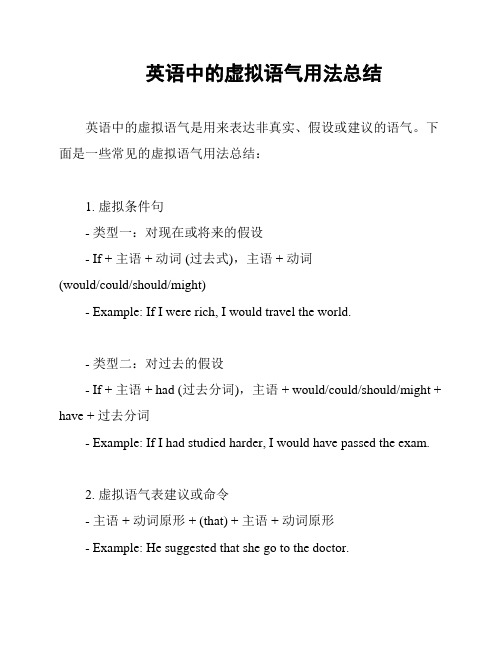
英语中的虚拟语气用法总结英语中的虚拟语气是用来表达非真实、假设或建议的语气。
下面是一些常见的虚拟语气用法总结:1. 虚拟条件句- 类型一:对现在或将来的假设- If + 主语 + 动词 (过去式),主语 + 动词(would/could/should/might)- Example: If I were rich, I would travel the world.- 类型二:对过去的假设- If + 主语 + had (过去分词),主语 + would/could/should/might + have + 过去分词- Example: If I had studied harder, I would have passed the exam.2. 虚拟语气表建议或命令- 主语 + 动词原形 + (that) + 主语 + 动词原形- Example: He suggested that she go to the doctor.3. 虚拟语气表愿望- 类型一:对现在或将来的愿望- 主语 + wish/es + 主语 + 动词过去式- Example: I wish I were taller.- 类型二:对过去的愿望- 主语 + wish/es + 主语 + 过去完成时- Example: I wish I had studied more.4. 虚拟语气表态度或建议- It is (high) time + 主语 + 过去式- Example: It is time that she left.- 主语 + would rather + 主语 + (did) + 动词原形- Example: She would rather he didn't smoke.这些是英语中常用的虚拟语气用法总结。
希望对您有帮助!。
虚拟语气用法总结
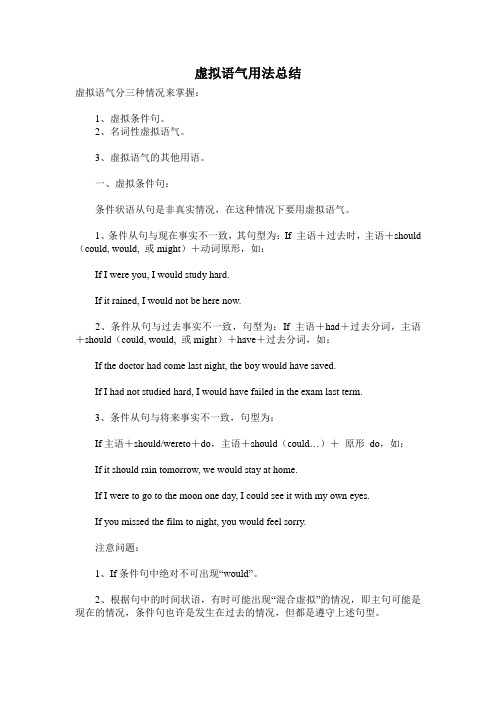
虚拟语气用法总结虚拟语气分三种情况来掌握:1、虚拟条件句。
2、名词性虚拟语气。
3、虚拟语气的其他用语。
一、虚拟条件句:条件状语从句是非真实情况,在这种情况下要用虚拟语气。
1、条件从句与现在事实不一致,其句型为:If 主语+过去时,主语+should (could, would, 或might)+动词原形,如:If I were you, I would study hard.If it rained, I would not be here now.2、条件从句与过去事实不一致,句型为:If 主语+had+过去分词,主语+should(could, would, 或might)+have+过去分词,如:If the doctor had come last night, the boy would have saved.If I had not studied hard, I would have failed in the exam last term.3、条件从句与将来事实不一致,句型为:If主语+should/wereto+do,主语+should(could…)+原形do,如:If it should rain tomorrow, we would stay at home.If I were to go to the moon one day, I could see it with my own eyes.If you missed the film to night, you would feel sorry.注意问题:1、If条件句中绝对不可出现“would”。
2、根据句中的时间状语,有时可能出现“混合虚拟”的情况,即主句可能是现在的情况,条件句也许是发生在过去的情况,但都是遵守上述句型。
3、在条件句中如果出现were, had, should可省去if,将主语与这些词倒装,例如:Had the doctor come last night, the boy would have saved.Were I to go to the moon one day, I would see it with my own eyes.Should it rain tomorrow, we would stay at home.二、名词性虚拟语气:在表示命令、建议要求、惊叹时的名词性从句中需用虚拟语气,基本句型:主语+(should)+动词原形,如:Mother insisted that John go to b ed at 9 o’clock.(宾语从句)We suggested that the meeting should not be held.It was required that the crops should be harvested at once.(主语从句)The suggestion that he be invited was rejected.(同位语从句)That is their demand that their wages be increased.(表语从句)注意:在这种句子中绝不出现“would”“must”“could”等。
虚拟语气的基本用法归纳
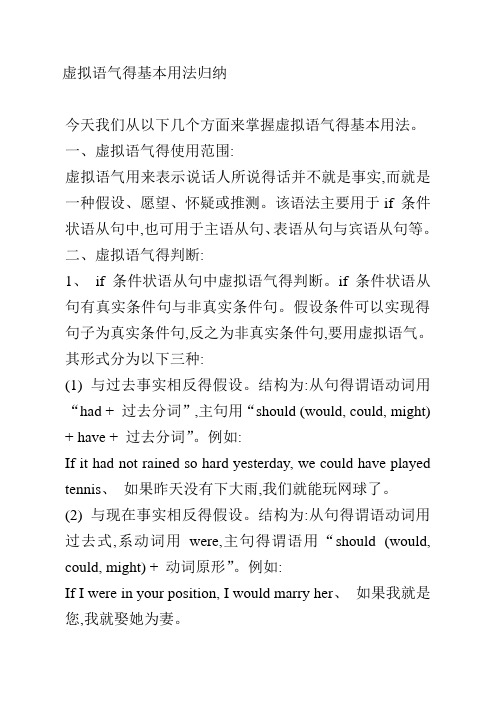
虚拟语气得基本用法归纳今天我们从以下几个方面来掌握虚拟语气得基本用法。
一、虚拟语气得使用范围:虚拟语气用来表示说话人所说得话并不就是事实,而就是一种假设、愿望、怀疑或推测。
该语法主要用于if 条件状语从句中,也可用于主语从句、表语从句与宾语从句等。
二、虚拟语气得判断:1、if 条件状语从句中虚拟语气得判断。
if 条件状语从句有真实条件句与非真实条件句。
假设条件可以实现得句子为真实条件句,反之为非真实条件句,要用虚拟语气。
其形式分为以下三种:(1) 与过去事实相反得假设。
结构为:从句得谓语动词用“had + 过去分词”,主句用“should (would, could, might) + have + 过去分词”。
例如:If it had not rained so hard yesterday, we could have played tennis、如果昨天没有下大雨,我们就能玩网球了。
(2) 与现在事实相反得假设。
结构为:从句得谓语动词用过去式,系动词用were,主句得谓语用“should (would, could, might) + 动词原形”。
例如:If I were in your position, I would marry her、如果我就是您,我就娶她为妻。
(3) 与将来事实相反得假设。
结构为:从句得谓语动词用“should (were to) + 动词原形”,主句用“should (would, could, might) + 动词原形”。
例如:If you should miss the chance, you would feel sorry for it、如果您错过了这次机会,您会难过得。
2、宾语从句中得虚拟语气。
(1) wish后接宾语从句中得虚拟语气:根据从句得意义来判断。
A: 表示与现在与将来事实相反得愿望,从句谓语动词用过去时态。
例如:I wish they were not so late、要就是她们来得不就是这么晚就好了。
- 1、下载文档前请自行甄别文档内容的完整性,平台不提供额外的编辑、内容补充、找答案等附加服务。
- 2、"仅部分预览"的文档,不可在线预览部分如存在完整性等问题,可反馈申请退款(可完整预览的文档不适用该条件!)。
- 3、如文档侵犯您的权益,请联系客服反馈,我们会尽快为您处理(人工客服工作时间:9:00-18:30)。
虚拟语气用法归纳虚拟语气主要指的的是带有非真实条件状语从句的复合句,表达的是说话人的遗憾后悔的语气,愿望以及建议,命令,要求等等的情感,往往说的是与事实相反或者没办法实现改变的东西。
虚拟语气主要表现为在对过去现在或者将来的情况做出假设后,有可能出现的情况。
虚拟语气的内容主要有三大模块,第一模块就是涉及到条件从句部分的内容。
这一部分的虚拟语气主要体现在三个方面:基本用法,各自为政,以及含蓄之美。
下表就是条件从句虚拟语气的基本用法:通常,在上面表格里反映的是非真实条件句的虚拟语气模式,从句和主句的谓语动词时间是一致的,如果两者时间不一致,此时就是混合型虚拟语气。
混合型虚拟语气的使用要求“各自为政”,即从句和主句根据各自假设的时间不同,采用上面表格中对应的的谓语动词形式。
如何“各自为政”呢这就像是数学里的排列组合,一边有三种情况,交叉一搭配就出现了好多种情况。
不管怎样,我们要遵循一个原则,就是“各自为政”。
例如,从句是对过去情况的假设,而主句则是对现在情况的假设,那我们在使用时,从句就用过去完成式,而主句要用would/could do的形式。
当然,也不是所有的AB配就是合理的,有时候在具体语境下,会出现矛盾的情况,这时我们就要结合要表达的意思来判断他们是对什么情况的假设,选择合适的形式。
一般而言,主句的假设时间会发生在从句的假设时间之后。
因为是有这么一个条件才会出现主句的现状。
因此在此类的完成句子练习中,我们要特别提醒注意时间状语的暗示1. If I had seen you, I would not be so worried now. (从句是对过去的假设,主句是对现在的假设)2. If you had not watched television so late last night, you would not be so sleepy now.( 从句是对过去的假设,主句是对现在的假设)3. If I were you, I would seize the chance to go abroad. (从句和主句都是现在的假设)4. Had you followed the doctor’s suggestion, you would be fine now.( 从句是对过去的假设,主句是对现在的假设)5. If I had made some money last summer, I would go on holiday next month.( 从句是对过去的假设,主句是对将来的假设)6. You didn’t let me drive. If we had driven in turns, you wouldn’t be so tired now. (从句是对过去的假设,主句是对现在的假设)7. If Jack hadn’t met Rose on his voyage, he would be alive now. (从句是对过去的假设,主句是对现在的假设)8. If Lily didn’t attend today’s party, she could not have the chance to work in the company next week. (从句是对现在的假设,主句是对将来的假设)9. Had Father followed my travel plan , our family would not stay at home now. (从句是对过去的假设,主句是对现在的假设)10. If I were your mother, I would let you go out this weekend. (从句是对现在的假设,主句是对将来的假设)虚拟语气在if引导的条件状语从句中,特别注意虚拟语气与倒装的结合,前提是省略if,这种情况多见于过去和将来的假设,具体表现是将if省略,把had, were, should之类词语提前构成倒装。
例如:Were I you, I would go.Should it happen, what should you do?Had he recognised me, he would have come over.虚拟语气中的“含蓄之美”指的是含蓄虚拟语气。
因为有时假设的情况并不是以if引导的条件从句形式出现,而是通过一些短语等形式暗示虚拟语气的存在,常用的词语有without, but for, otherwise, or等等,此时我们可以从意思上推断出虚拟语气的时间(考试时多数情况是对过去的假设)。
But for your encouragement, I would not have been admitted to this university. (过去)Without water, all lives would die. (现在)He felt too tired yesterday, or he would have attended my party. (过去)I was having a meeting, otherwise I would have come to see you off. (过去)虚拟语气的第二模块就是含有should +V的用法,这一部分主要是有关建议和命令的相关从句,包括主语从句,宾语从句,表语从句,同位语从句以及以之相关的形式主语宾语之类的从句。
这一部分的词主要有常见的动词有advise, suggest, insist, order, require, recommend, command以及相关名词等等。
记忆口诀:一个坚持(insist),两个命令(order, command),三个建议(suggest, advise, recommend),四个要求(ask, require, demand, request)。
1. 宾语从句的虚拟语气He insisted that the meeting be put off.The general ordered (that) all the soldiers (should ) leave.He gives orders that the soldiers (should) leave.2. 表语从句的虚拟语气My suggestion is that we (should) stay here for a rest.3. 同位语从句的虚拟语气There is no suggestion that she (should) resign.4. 主语从句的虚拟语气主要体现在It做形式主语的三种情况:It’s +p.p +that ;It’s + adj. +that;It’s + n. +that常用的动词recommand, demand, desire, order, request, require, suggest,command常用的形容词important, necessary, right, advisable, natural, strange, surprising, regretful,urgent, vital, insistent, essential常用的名词duty, pity, no surpise, no wonder, shame, regret其实这些词在句子中其实也有建议命令类似的的意思It’s important that you should take the medicine.It’s a pity that you should refuse the invitation.It’s essential that we should learn some knowledge about fist aid.It’s demanded that all the students should go to the playground.It was suggested that he should join the club activities.5. It为形式宾语的情况实际上是上面形式主语的一种变形,是以it为形式宾语的复合宾语从句,it后面的宾语补足语多为形容词或名词,常见词就是上面形式主语后面的那些词。
I consider it vital that he (should) think deeply before acting.We think it necessary that the meeting (should) be put off.6. 某些词语如suggest, insist 等有双重含义,所以在使用的时候要注意什么时候用虚拟语气,什么时候不用虚拟语气。
Her smile suggested that she was in favor of the plan.We insisted that what the boy did was wrong.虚拟语气的第三大模块指的是虚拟语气在特殊句式中的运用。
句这些句式使用的虚拟语气与上面的虚拟语气会有所不同,主要有两种情况:I. would rather, It’s time…, for fear that…would rather在使用时要注意它的不同用法。
因为本身would rather可以直接接动词原形,构成would rather do sth. (than do sth.else); 或者would do sth. rather than do sth.else.而虚拟语气的would rather 是这样使用的would rather sb. did(对现在或将来的假设)/ had done(对过去的假设)I would rather he didn’t go now.They would rather they hadn’t attended the party.It’s (about) (high) time (that)…从句中常用过去式(有时也用should do), 含建议的意思。
汉语的意思为“是该做…的时候了”,也等于It’s time for sb. to do sth.It’s high time (that) we went home.It’s high time that we (should) go home.It’s high time for us to go home.for fear that 后面可以接虚拟语气should do,也可以接其他语气,但依然会有一个情态动词。
